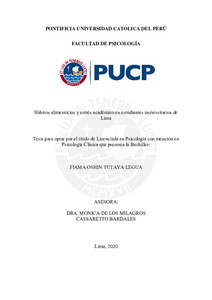| dc.contributor.advisor | Cassaretto Bardales, Mónica de los Milagros | |
| dc.contributor.author | Tutaya Legua, Fiama Oshin | |
| dc.date.accessioned | 2021-03-16T16:50:41Z | |
| dc.date.available | 2021-03-16T16:50:41Z | |
| dc.date.created | 2020 | |
| dc.date.issued | 2021-03-16 | |
| dc.identifier.uri | http://hdl.handle.net/20.500.12404/18600 | |
| dc.description.abstract | La presente investigación tuvo como propósito analizar la relación entre los hábitos
alimenticios y estrés académico en estudiantes universitarios. Con este fin, se evaluó a
174 jóvenes, 102 mujeres (59%) y 72 hombres (41%), entre 16 y 24 años (M= 18.55; DE=
1.53). Los instrumentos utilizados fueron el cuestionario “Adolescent Food Habits
Checklist” versión venezolana (AFHC-V) (Morales, Montilva, Gómez & Cordero, 2012),
el cual fue ajustado lingüísticamente al contexto peruano; y el Inventario SISCO de Estrés
Académico (Barraza, 2007). Se hallaron relaciones significativas, aunque bajas, entre la
dimensión relaciones psicológicas y el AFHC-V (r=-.15, p<.05); al igual que con el factor
consumo de frutas y/o vegetales (r=-.16, p<.05). También, entre la dimensión
afrontamiento y el AFHC-V (r=-.16, p<.05), así como con el factor evasión de alimentos
densamente calóricos (r=.15, p<.05). Respecto al estrés académico, se observaron
diferencias en función al sexo en estresores y síntomas psicológicos. Se reportaron
correlaciones entre los indicadores de estrés académico con la percepción del rendimiento
académico y de los hábitos alimenticios. Además, se encontraron diferencias según sexo
y facultad en los factores consumo de bajas cantidades de grasas, evasión de alimentos
densamente calóricos y el AFHC-V. Se hallaron asociaciones entre la percepción de los
hábitos alimenticios y el factor evasión de alimentos densamente calóricos y el AFHC-V.
Se exploró el IMC en los universitarios, encontrando diferencias en función al sexo.
Finalmente, se discuten los resultados en relación a lo que señala la literatura, así como
las dificultades metodológicas de la medición de los hábitos alimenticios. | es_ES |
| dc.description.abstract | The purpose of this research was to analyze the relationship between eating habits and
academic stress in college students. This study evaluated 174 college students, 102
women (59%) and 72 men (41%), between 16 and 24 years old (M= 18.55; SD= 1.53).
The instruments used were the Venezuelan version questionnaire “Adolescent Food
Habits Checklist” (AFHC-V) (Morales, Montilva, Gómez & Cordero, 2012), which was
linguistically adjusted to the Peruvian context; and the SISCO Inventory of Academic
Stress (Barraza, 2007). Low relationships were found between the psychological
relationships dimension and the AFHC-V (r=-.15, p<.05); as well as with the fruit and
vegetable consumption factor (r=-.16, p<.05). Also, between the coping dimension and
the AFHC-V (r=-.16, p<.05), as with the factor avoidance of specific energy-dense foods
(r=.15, p<. 05). About the academic stress, there are differences according to sex in the
stressor dimensions and psychological symptoms. Correlations were reported between
the indicators of academic stress with the perception of academic performance and eating
habits of college students. About the eating habits, differences were reported according
to sex and faculty in the factors of consumption of low amounts of fats, avoidance of
specific energy-dense foods and the AFHC-V. Associations were found between the
perception of eating habits and the factor avoidance of specific energy-dense foods and
the AFHC-V. Also, BMI was explored in college students, finding differences according
sex. Finally, the results are discussed in relation to what the literature indicates, as well
as the methodological difficulties of measuring eating habits. | es_ES |
| dc.language.iso | spa | es_ES |
| dc.publisher | Pontificia Universidad Católica del Perú | es_ES |
| dc.rights | info:eu-repo/semantics/openAccess | es_ES |
| dc.rights.uri | http://creativecommons.org/licenses/by/2.5/pe/ | * |
| dc.subject | Estudiantes universitarios--Salud mental--Perú | es_ES |
| dc.subject | Hábitos alimenticios--Perú | es_ES |
| dc.subject | Stress en adolescentes--Perú | es_ES |
| dc.title | Hábitos alimenticios y estrés académico en estudiantes universitarios de Lima | es_ES |
| dc.type | info:eu-repo/semantics/bachelorThesis | es_ES |
| thesis.degree.name | Licenciado en Psicología con mención en Psicología Clínica | es_ES |
| thesis.degree.level | Título Profesional | es_ES |
| thesis.degree.grantor | Pontificia Universidad Católica del Perú. Facultad de Psicología | es_ES |
| thesis.degree.discipline | Psicología con mención en Psicología Clínica | es_ES |
| renati.advisor.dni | 09491245 | |
| renati.advisor.orcid | https://orcid.org/0000-0002-4880-6092 | es_ES |
| renati.author.dni | 70891395 | |
| renati.discipline | 313026 | es_ES |
| renati.juror | Martínez Uribe, Patricia | es_ES |
| renati.juror | Cassaretto Bardales, Mónica de los Milagros | es_ES |
| renati.juror | Brahim Tabja, Daniella | es_ES |
| renati.level | https://purl.org/pe-repo/renati/level#tituloProfesional | es_ES |
| renati.type | http://purl.org/pe-repo/renati/type#tesis | es_ES |
| dc.publisher.country | PE | es_ES |
| dc.subject.ocde | http://purl.org/pe-repo/ocde/ford#5.01.00 | es_ES |






